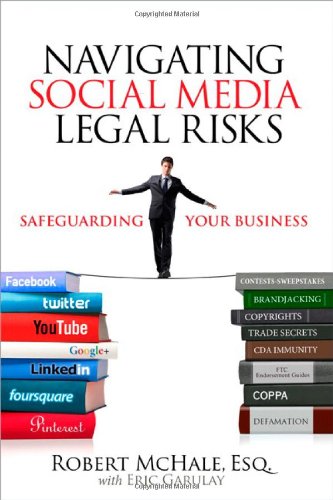Having a presence on social media is a MUST for any business these days. No one can denying that Facebook, Twitter, Google+, LinkedIn, etc. is the most effective way for us to reach our clients, employees and peers. Unfortunately, even in this arena, the risk of lawsuits abound. To protect your business, you need to develop a social media policy that complies with the issues discussed below:
(photo: Google Images)
I) False Advertising:
In the area, social media is governed by the laws that govern conventional media advertising. So, you have to be careful when you make claims that are opinions but are presented as facts.
II) Deceptive Business Practices:
You cannot give your customers an incentive to put in a good word for you online.
III) Infringement on Intellectual Property:
You have to be careful about showcasing products, logos, etc. by third parties without their prior written approval.
- In addition you should also be vigilant about protecting your company's intellectual property online because allowing trademark infringement may result in you losing your trademark.
I) Managing Your Reputation Online (Libel):
So what should you do when your customers post negative reviews? Can you take legal action to remove the comment from the web? Social media companies (Google, Facebook, etc.) cannot be held liable for comments by their users. It will also be difficult to track down customers who use made-up username online.
II) Selling Customer Information To Third Parties:
Collecting and then selling customer information to third parties is OK so long as you disclose how you will use this information, in advance, to your customers.
(photo: Google Images)
I) Screening Job Applicants Via Social Media:
If the law prohibits you from from relying on certain information when hiring (e.g. place of residence, religion or sexual orientation), then you cannot use use such information gathered from social media in your hiring decision.
II) Employee Access To Social Media At Work:
You have the right to decide if you will allow employees to have access to social media on company computers during work hours.
You cannot, however, restrict your employees ability to: (i) criticize your company online ( regarding work conditions, wages, etc.) or (ii) engage with other workers regarding their employment on social media sites during non-work hours (e.g. during break or lunch).
III) Employee Use of Social Media on Behalf of Your Business:
You may have your employees conduct social media activities for your business, however:
- if these employees use your account to make disparaging remarks or comments, you may be held liable.
- If you ask your employees to make testimonials you must disclose their affiliation with your company.
- you MUST establish social media accounts in your company's name (and not under the employee's personal name. If you don't,the account will belong to the employee if and when he/she decides to leave your company.
IV) Develop Cohesive and Comprehensive Social Media Policy:
You should develop a social media policy that incorporates existing policies on: internet use, unlawful discrimination, sexual harassment, bullying, and insider trading, etc.
AND- incorporate this policy as part of your regular employee training program
By using this site you agree that there is no attorney-client relationship between you and The Legal Curator.
The Legal Curator presents the legal information on this website as a service to members of the general public. While the information on this site is about legal issues, it is not intended as legal advice or as a substitute for the particularized advice of your own counsel. If you are seeking specific legal advice or assistance, you should retain an attorney.
We Recommend
Did you know that there are three ways that others can drag your company's reputation through the mud? When that happens, you cannot simply throw money at the problem, nor ignore it and hope it goes away. There is, however, one thing you can do to combat those who insist on thrashing your company's reputation online.
As business owners, we live in fear of our customer database being hacked. In a situation where their most private information is exposed, we can expect lawsuits from our clients. But the government? Why would they be suing us, the victim, after we’ve been hacked? Well, they recently got this right from a federal court. Find out how to avoid of this pitfall.
Recently, I wrote two blog posts about the actions some business people were taking to shield themselves from negative reviews from their customers. One tactic was to have customers sign contracts that allowed the business to penalize anyone that left a negative review on social media. The other approach was to legally try to discredit Yelp. Though neither of these ploys has been particularly effective, I can understand why businesses might be tempted to take action to protect themselves.
These days we essentially have a choice between Microsoft Office and Google Docs when it comes to meeting our back office needs. Though each has its benefits (according to Sarah Austin, Google is better for collaboration while Microsoft is better for those who use spreadsheets on a regular basis), legally they are quite different.












